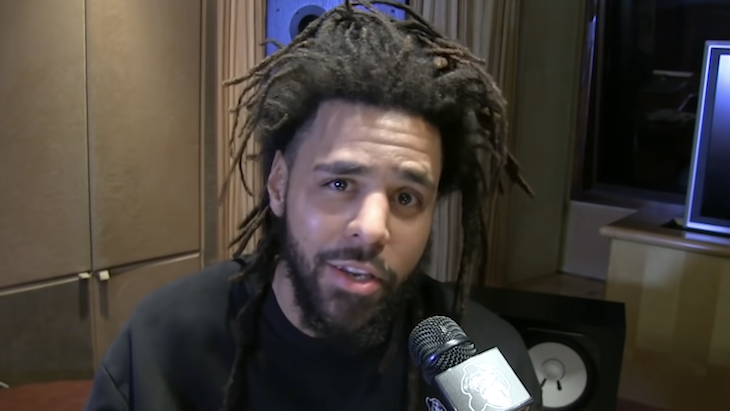
J. Cole Reveals His 1st Rap Name & Why He Changed It
After a long, busy year in Hip-Hop, this week’s biggest story may be J. Cole’s interview with Nardwuar. Published on Christmas Day (December 25), the hour-long conversation was years in the making. As usual, The Human Serviette astounded his subject with research, physical props, and plenty of space to unpack lesser-known history.
At 11:43, Nardwuar mentions J. Cole’s first Rap name. “Bomm Sheltuh, he named you The Therapist?” Cole responds, “Yeah, they. It was a duo. Two rappers—one was a rapper and producer, from Fayetteville, North Carolina. I wouldn’t be here if it wasn’t for them because they were from my city, and they music, to me, that sounded just as good as OutKast or Redman [&] Method Man.” In 2013, journalist Harold Stallworth did a comprehensive feature on Bomm Sheltuh for Passion Of The Weiss, including some of their music. Cole continues, “It was the first time I heard somebody from the city doing quality-type music that was similar to what I listened to. So, they had the coolest Rap names I ever heard: Nervous Reck was one of them, and the other one was Filthe Ritch—they spelled ’em all cool. I was just like, damn, I need a Rap name like that. So they offered to help me find a Rap name.”
J. Cole Told Dr. Dre About Kendrick Lamar & Wanted To Sign Him
Bomm Sheltuh honored their promise. Cole explains, “One day they called me up and was like, ‘Yo, we got one for you.’ I was all excited; I thought my sh*t was gonna be just as fire as theirs. I was like, what is it? They were like, ‘It’s Therapist.’ My heart said nooo, but my admiration and love for them and the feeling that these guys gave me a name was like, ‘Aw, that’s dope.’ So I kept that name for about four or five years, until I got to college and realized I’m not trying to go by no f*ckin’ [alias],” Cole says. At Queens, New York’s St. John’s University, he swapped his moniker to be an abbreviation for his name, Jermaine Cole. Of The Therapist, Cole admits, “It feels like a wrestler or something. But I will say, it’s a practical joke or a wink from God because in my life—now as an adult man—I realize that I play that role for a lot of people, and willingly and lovingly.” He adds, “I love to listen to people talk; I love to ask them questions that may allow them to open up a part of themselves that maybe they hadn’t thought about before or accessed before. So ironically, I have become the therapist without that Rap name.”
Notably, J. Cole named Dreamville’s headquarters studio after Bomm Sheltuh. After six years, and formative recordings by Ari Lennox, J.I.D., EarthGang, Cozz, and others, Dreamville recently closed the studio and living space.
Flavor Flav Tells The Origin Story Behind Wearing Clocks (Video)
Later in the interview, at 25:00, Nardwuar presents J. Cole with Schoolly D’s “PSK ‘What Does It Mean?'” 12″ picture-cover vinyl. The two discuss the West Philadelphia MC/producer’s role as Gangsta Rap’s pioneer before Nardwuar points to Schoolly’s enclosed illustration of his Roland TR-909 drum machine. “Okay, so what do you know about TR-909? ‘Cause I have a little story about the TR-909,” Cole begins; Nardwuar insists. “Well, the TR-909…everyday when I was 14 years old, I used to beg my mom to get me a beat machine.”
Cole then brings it back to Bomm Sheltuh, who he hung with as a teen. “I really wanted them to give me beats because I didn’t know how to make beats. Once I got with them, I realized they’re never gonna give me their best beats. They’re gonna keep the best beats for themselves [because they are artists, too]. So I realized I gotta make my own sh*t ’cause they’re never gonna give me their best.”
Schoolly D Remembers “P.S.K.” By Clarifying What Gangsta Rap Really Means (Video)
Cole involved his mom in mission. “Every day we would stop at McFadden Music [in Fayetteville], and they had beat machines in there. Cole wanted to display his passion for production. “[We would go] so she should see how much I really wanted this beat machine, and I [the one] I would play with and thought was the beat machine I wanted, the TR-909. I used to play with this sh*t while I was in there.” However, Cole would learn the skill with another tool of the trade. “But what I realized was that wasn’t for me. Nervous Reck helped me see that what I really wanted was [the Ensoniq] ASR-X Pro. Now most people that use the ASR, they use the ASR-10 with the keyboard. Beggars can’t be choosers; the only thing they had in McFadden Music was this red ASR-X Pro, and sh*t—my mom was down; she put that sh*t on layaway [and] paid that sh*t off for a whole year and took it out, and I had my ASR-XPro.”
Since then, J. Cole has gone on to produce his own hits, along with acclaimed tracks for Kendrick Lamar, Pusha-T, and Cordae.
J. Cole Reveals Who Kill Edward Is And It’s Deeper Than Rap
Cole’s The Off-Season was named by Ambrosia For Heads among 2021’s best albums, as well as Gold Mouf by Dreamville MC Lute.
#BonusBeat: A recent episode of Ambrosia For Heads‘ What’s The Headline podcast that compares J. Cole to Tim Duncan: